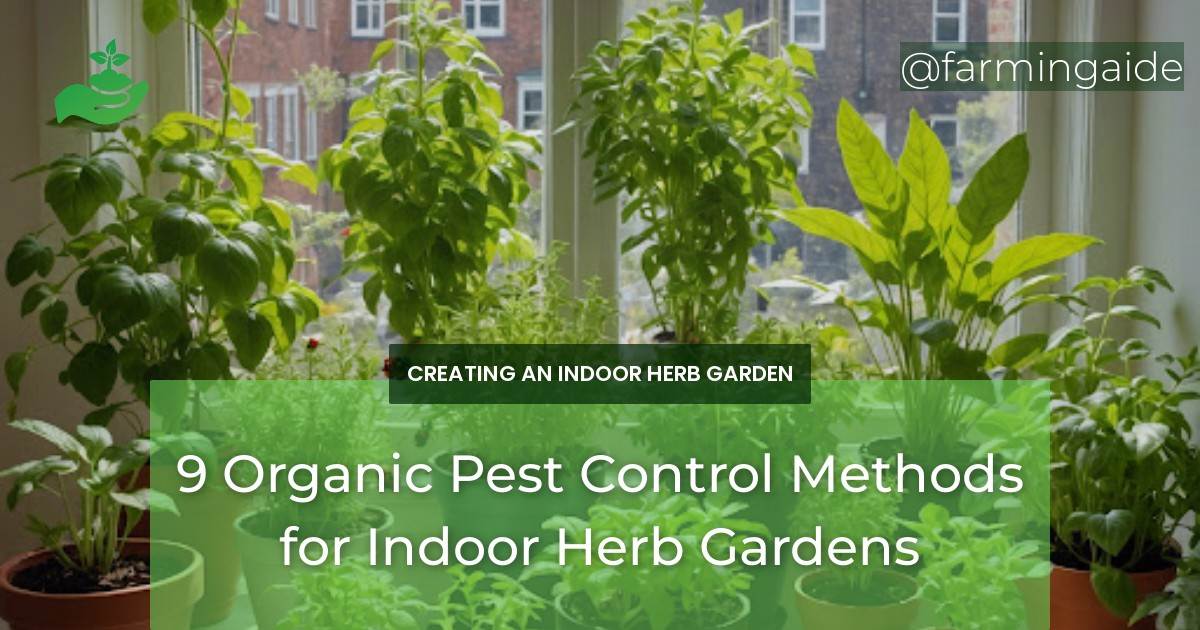Imagine walking into your cozy indoor herb garden, expecting to be greeted by the fresh aroma of basil or the soothing scent of mint. Instead, you’re met with the unsettling sight of pests ravaging your beloved plants. The good news is that you don’t have to resort to harsh chemicals to combat these unwanted visitors. In this article, we’ll delve into the world of organic pest control methods, exploring nine effective and eco-friendly solutions to keep your indoor herb garden thriving.
Key Takeaways
- Organic pest control methods are safer for humans, pets, and the environment.
- Natural predators, homemade pesticides, and physical barriers are effective control methods.
- Cultural control methods, biological control agents, and essential oils can also be used.
- Companion planting is a simple yet effective way to deter pests.
- A combination of methods yields the best results in maintaining a healthy indoor herb garden.
Introduction to Organic Pest Control
When it comes to indoor herb gardens, pest control is an essential aspect of maintaining a healthy and thriving environment. While chemical pesticides might offer a quick fix, they can have devastating consequences on the environment and human health. Organic pest control methods, on the other hand, provide a safer and more sustainable solution. By embracing these eco-friendly approaches, you’ll not only protect your plants but also the planet.
Importance of Organic Methods
The importance of organic pest control methods cannot be overstated. Chemical pesticides have been linked to a range of health problems, from respiratory issues to cancer. Furthermore, these toxic substances can contaminate soil, air, and water, causing long-term damage to ecosystems. Organic methods, by contrast, promote a balanced ecosystem, minimizing harm to beneficial insects and the environment.
Common Pests in Indoor Herb Gardens
Before we dive into the world of organic pest control, it’s essential to understand the common pests that plague indoor herb gardens. These include:
- Aphids
- Whiteflies
- Spider mites
- Mealybugs
- Fungus gnats
Natural Predators for Pest Control
One of the most effective organic pest control methods involves introducing natural predators into your indoor herb garden. These beneficial insects prey on pests, providing a safe and sustainable solution.
ALSO READ
Introduction to Beneficial Insects
Beneficial insects are nature’s pest control agents. By introducing these helpful insects into your indoor herb garden, you’ll create a balanced ecosystem where pests are kept under control.
Best Predators for Common Pests
Here are some of the most effective natural predators for common pests in indoor herb gardens:
| Pest | Natural Predator |
|---|---|
| Aphids | Ladybugs, lacewings |
| Whiteflies | Encarsia formosa |
| Spider mites | Phytoseiulus persimilis |
| Mealybugs | Cryptolaemus montrouzieri |
| Fungus gnats | Hypoaspis miles |
Homemade Pesticides
While natural predators are an excellent way to control pests, homemade pesticides can provide an additional layer of defense for your indoor herb garden.
ALSO READ
Recipes for Effective DIY Pesticides
Here are a few simple recipes for homemade pesticides:
- Neem oil and soap solution: Mix 2 tablespoons of neem oil with 1 teaspoon of mild soap and 1 quart of water.
- Garlic spray: Blend 3 cloves of garlic with 1 quart of water and let it sit for 24 hours. Strain and use as a spray.
Application Techniques
When using homemade pesticides, it’s essential to apply them correctly to maximize their effectiveness. Spray the solution on the affected areas, making sure to cover all surfaces thoroughly.
Physical Barriers and Traps
In addition to natural predators and homemade pesticides, physical barriers and traps can help control pests in your indoor herb garden.
Types of Barriers and Traps
Some effective physical barriers and traps include:
- Sticky traps
- Yellow traps
- Fine-mesh screens
Installation and Maintenance
Install sticky traps or yellow traps near the affected areas, replacing them regularly. Fine-mesh screens can be placed around individual plants or the entire garden bed.
Cultural Control Methods
Cultural control methods involve adjusting your gardening practices to prevent pest infestations.
Proper Plant Spacing
Ensure proper plant spacing to promote air circulation and prevent moisture buildup, which can attract pests.
Regular Garden Maintenance
Regularly inspect your plants, removing any infested or damaged leaves to prevent the spread of pests.
Biological Control Agents
Biological control agents are microorganisms that target specific pests, providing a targeted approach to pest control.
Introduction to Biological Control
Biological control agents are an effective way to control pests while promoting a balanced ecosystem.
Common Biological Control Agents
Some common biological control agents include:
- Bacillus thuringiensis (Bt)
- Beauveria bassiana
- Trichoderma harzianum
Essential Oils for Pest Deterrence
Certain essential oils have natural pest-deterrent properties, making them a great addition to your organic pest control arsenal.
Effective Essential Oils
Some effective essential oils for pest deterrence include:
- Peppermint oil
- Lemongrass oil
- Citronella oil
Application Methods
Mix a few drops of the essential oil with water and spray it on the affected areas or add it to your homemade pesticides for enhanced effectiveness.
Companion Planting
Companion planting is a simple yet effective way to deter pests from your indoor herb garden.
Plants that Deter Pests
Some plants that naturally deter pests include:
- Basil
- Mint
- Chives
- Garlic
Benefits of Companion Planting
Companion planting promotes a balanced ecosystem, reduces pest infestations, and enhances the overall health of your indoor herb garden.
Conclusion and Final Tips
By incorporating these nine organic pest control methods into your indoor herb gardening routine, you’ll create a thriving and balanced ecosystem. Remember to always monitor your plants closely, and don’t hesitate to combine multiple methods for optimal results.
Long-term garden health is a journey, and embracing organic pest control methods is a crucial step towards creating a sustainable and harmonious indoor herb garden.


